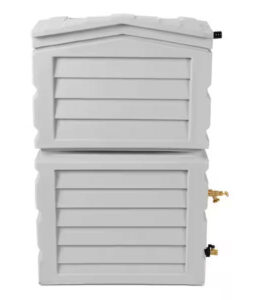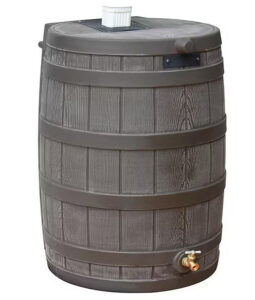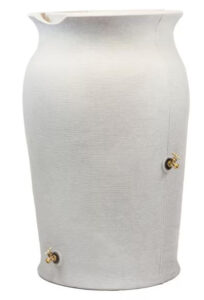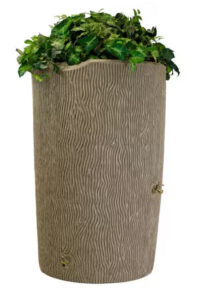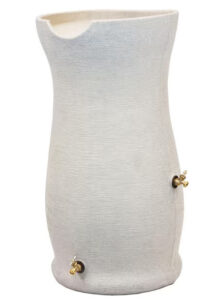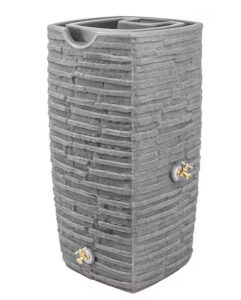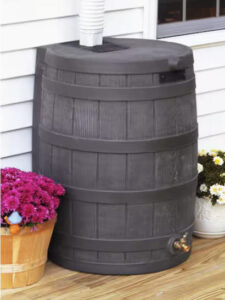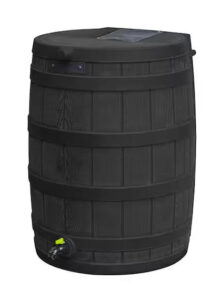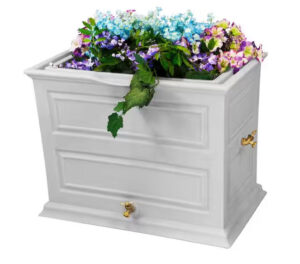Rain Barrels & water storage
Rain barrels provide numerous benefits for homeowners and the environment. By capturing rainwater from rooftops, they can save up to 1,300 gallons of water annually, reducing water bills and providing a free, chemical-free source for irrigating gardens and lawns. This promotes healthier plants and conserves municipal water resources. Additionally, rain barrels help mitigate stormwater runoff, preventing erosion, flooding, and pollution in local waterways. With easy-to-install, high-quality barrels, homeowners can embrace sustainable practices, support eco-friendly living, and enhance their property’s resilience during dry spells or water restrictions, all while contributing to a greener community.
Are Rain Barrels a Good Idea?
Yes, rain barrels are generally a good idea for most homeowners, especially if you have a garden, lawn, or outdoor plants to water. They promote water conservation, reduce stormwater runoff, and can lower your utility bills by capturing “free” rainwater from your roof. According to the EPA, a single rain barrel can save the average household up to 1,300 gallons of water per year, which translates to noticeable savings on water bills. However, their effectiveness depends on your local climate, rainfall patterns, and maintenance willingness— they shine in rainy areas with dry spells but may feel like a hassle in consistently arid regions. Below, I’ll break down the key pros and cons based on expert sources like the EPA, university extensions, and homeowner experiences.
| Aspect | Pros | Cons |
|---|---|---|
| Water Savings & Cost | – Saves 1,000–1,300 gallons annually, cutting water bills (e.g., ~$1 per full 55-gallon barrel used). – Provides free, soft rainwater ideal for plants (no chlorine or fluoride like tap water), leading to healthier gardens. | – Upfront cost ($50–$150 for a basic 55-gallon barrel; cheaper via city programs). – Limited storage (50–100 gallons typical) means frequent refills in dry seasons; not enough for large lawns without multiples. |
| Environmental Impact | – Reduces stormwater runoff, preventing flooding, erosion, and pollution in local waterways. – Conserves municipal water resources and supports sustainability (e.g., 12% of homebuyers prioritize green features like this). | – Potential for contaminated water if not filtered (e.g., bird droppings, roof chemicals, or air pollutants), making it unsafe for edibles without testing. – Manufacturing plastic barrels has an environmental footprint, potentially offsetting small-scale savings. |
| Practicality & Maintenance | – Easy to install under a downspout; many cities subsidize or distribute them. – Great for irrigation during droughts or restrictions, plus indoor plants like orchids. | – Requires regular cleaning (yearly or seasonal) to prevent algae, bacteria, or clogs; can get “gross” if neglected. – Attracts mosquitoes if not screened; needs overflow management to avoid yard flooding. – Limited in low-rain areas—may empty quickly without recharge. |
When They’re Worth It
- Ideal for: Gardeners in moderate-rainfall zones (e.g., Pacific Northwest or Midwest) with small-to-medium yards. Homeowners focused on eco-friendly practices or facing summer water bans will appreciate the self-sufficiency.
- Less ideal for: Very dry climates (e.g., Southwest deserts) where barrels fill infrequently, or those unwilling to maintain them—Reddit users often note they’re “more hassle than help” for low-water needs or travel-heavy lifestyles.
- Tips to Maximize Benefits: Start with a food-grade, dark-colored 55-gallon barrel (repurposed ones work if chemical-free). Add a mesh screen, elevate on cinder blocks for easy access, and connect multiples for more capacity. Direct overflows to permeable areas like lawns. Check local bylaws—most places encourage them, but some restrict collection.
Overall, the pros (savings, plant health, eco-benefits) outweigh the cons for casual users, making rain barrels a simple, rewarding step toward sustainability. If you’re handy, DIY tutorials abound for under $20. For larger needs, consider scaling up to cisterns.
CLICK TO APPLY FOR REBATE

